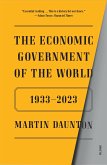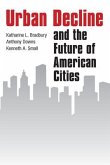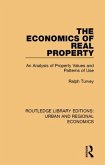A pioneering urban economist presents a myth-shattering look at the majesty and greatness of cities America is an urban nation, yet cities get a bad rap: they're dirty, poor, unhealthy, environmentally unfriendly . . . or are they? In this revelatory book, Edward Glaeser, a leading urban economist, declares that cities are actually the healthiest, greenest, and richest (in both cultural and economic terms) places to live. He travels through history and around the globe to reveal the hidden workings of cities and how they bring out the best in humankind. Using intrepid reportage, keen analysis, and cogent argument, Glaeser makes an urgent, eloquent case for the city's importance and splendor, offering inspiring proof that the city is humanity's greatest creation and our best hope for the future. "A masterpiece."-Steven D. Levitt, coauthor of Freakonomics "Bursting with insights."-The New York Times Book Review
Hinweis: Dieser Artikel kann nur an eine deutsche Lieferadresse ausgeliefert werden.
Hinweis: Dieser Artikel kann nur an eine deutsche Lieferadresse ausgeliefert werden.

Mehr als die Hälfte der Weltbevölkerung lebt heute in Städten, und der Trend zur Urbanisierung hält an. In seinem leidenschaftlichen Lob der Stadt als Ort der Innovation und Inspiration unterstreicht der in Harvard lehrende Ökonom Edward Glaeser die positiven Effekte solcher Verstädterung. Sein Buch ist eine Denkschrift gegen die durch niedrige Energiepreise und Steuervorteile für Hauseigentümer begünstigte Abwanderung vieler Amerikaner in die Vorstädte. Das Leben in Städten sei nicht nur ökologisch verträglicher und gesünder, es stimuliere auch wirtschaftliche Entwicklung und bringe viele zu Wohlstand. Nicht nur Bangalore und Silicon Valley, auch die Slums von Lagos und Rio de Janeiro preist er als Laboratorien unternehmerischen Erfindungsreichtums. Leipzig lobt Glaeser für stadtplanerisch geordnete Gesundschrumpfung, obwohl er ansonsten nicht viel für eingriffsintensive Regulierungspolitik übrighat. Der Ökonom votiert für radikale Stadterneuerung, für immer höhere und dichter gestaffelte Gebäude. Von Denkmalschutz zur Erhaltung spezifischer städtischer "Eigenlogik" (Martina Löw) hält er wenig. Dabei hat das Sicherheitsniveau einer Stadt, für Glaeser so wichtig wie Bildungsmöglichkeiten, viel mit der Atmosphäre, dem "Charakter" eines städtischen Raums zu tun. Der aber ist für Gläser vor allem Kommunikationsraum, Markt der Ideen. Dass räumliche Nähe in Zeiten globaler Vernetzung wertvoller ist denn je, das konnte man längst bei Saskia Sassen lesen, deren einflussreiche Studien zur Stadtsoziologie Glaeser aber offenbar gar nicht zur Kenntnis genommen hat. (Edward Glaeser: "Triumph of the City". How Our Greatest Invention Makes Us Richer, Smarter, Greener, Healthier, and Happier. The Penguin Press, New York 2011. 338 S., geb., 19,95 [Euro].) ake.
Alle Rechte vorbehalten. © F.A.Z. GmbH, Frankfurt am Main








